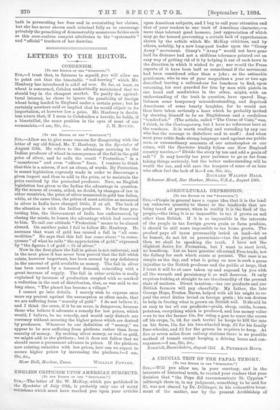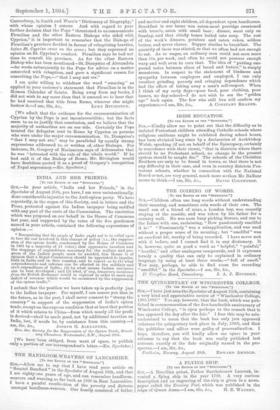A CRUCIAL TEST OF THE PAPAL THEORY.
[TO THE EDITOR OP THE "SPECTATOR."]
you allow me, in your courtesy, and in the interests of historical truth, to remind your readers that your decision that "the Pope did excommunicate St. Cyprian " (although there is, in my judgment, something to be said for it), was not shared by Dr. Dellinger, in his exhaustive treat-. ment of the matter, nor by the present Archbishop of Canterbury, in Smith and Wace's "Dictionary of Biography," with whose opinion I concur. And with regard to your further decision that the Pope " threatened to excommunicate Firmilian and the other Eastern Bishops who sided with .Cyprian," it is important to remember that the Bishops of 'irmilian's province decided in favour of rebaptising heretics, before St. Cyprian came on the ecene ; but they expressed no opinion on St. Cyprian's conduct. Firmilian says he had not time to consult his province. As for the other Eastern Bishop who has been mentioned—St. Dionysius of Alexandria he wrote subsequently to the Pope for advice on a matter ootuaected with rebaptiam, and gave a significant reason for .consulting the Pope,—" that I may not err."
I am quite willing to withdraw the word " amazing" as applied to your reviewer's statement that Firmilian is in the Roman Calendar of Saints. Being away from my books, I slid not wish to say more than that it amazed me to hear that he had received that title from Rome, whoever else might [We admit that the evidence for the excommunication of Cyprian by the Pope is not incontrovertible; but the facts seem to us to justify that conclusion, and we believe that the majority of authorities are on our side. Certainly the Pope treated the delegates sent to Rome by Cyprian as persons who were under the major excommunication. St. Dionysins's 4$ that I may not err," may be paralleled by equally strong expressions addressed to, or written of, other Bishops. For instance, St. Gregory of Nazianzum says of Athanasius that he was " intrusted with the rule of the whole world." If he had said it of the Bishop of Rome, Mr. Rivington would have doubtless quoted it as a proof of Gregory's recognition e:Lf Papal supremacy.—ED. Spectator.]



































 Previous page
Previous page